|
|

|

Devastatingly Addictive Behaviors vs. Good Addictions ...
How to Replace One With the Other
by www.SixWise.com
You’ve probably got several “addictions” or “bad habits” that, in the back of your mind, you think about changing. It could be your two to three nightly cocktails, your love of generous sized desserts or your tendency to procrastinate for days on projects you know you could complete in a few hours.
Whatever “IT” is, kicking the behavior would add quality to your life in terms of time, health, money, relationships, productivity and maybe all of the above. It’s important, though, not to simply quit your addictive behavior without some forethought, namely what you’ll replace that behavior with.
You see, once you take an unhealthy addictive behavior away, you should add a similar healthy one to your life to replace it. That way, whenever you’re tempted to revert to your old habits, you’ll have a new, better habit to distract you. In fact, you are far more likely to succeed at kicking your bad habits if you replace them with healthier ones.
Ideally, you will want to decide ahead of time what behavior you will use to replace your addiction, and ensure it is both healthy and controlled. Here, we’ve done some of the work for you, and detailed 10 common unhealthy addictive behaviors along with examples of healthy replacement “addictions” …
Delve into the importance of replacing your existing repetitive behaviors that are unhealthy.
| |
Unhealthy Addictions |
Healthy Replacements |
| 1. |
Complaining

Do you ever revel in the idea of complaining to others about someone or something? Are you convinced you’ve gotten the short straw one too many times, or that others are conspiring against you, and you’re eager to share your sad stories with those around you? This type of negative mindset can lead to depression, anxiety and physical health problems, and may make your life more prone to problems.
|
Complimenting

“You can catch more flies with honey than with vinegar,” as the saying goes. Likewise, if your mental state is optimistic, you will naturally attract more of the same into your life, according to the Law of Attraction. This posits that if you focus on positive things you'll attract good into your life. But the opposite also holds true: if you worry constantly and think negatively, you may attract more of that into your life.
So we suggest focusing on the positive by complimenting not only those around you, but also being gracious when speaking about your own life and good fortune. “Turn lemons into lemon-aid” as is nearly always possible. People will love you for being so good-natured!
|
| 2. |
Splurging on Stuff You “Want”

Many Americans are suffering from “affluenza,” “a painful, contagious, socially transmitted condition of overload, debt, anxiety and waste resulting from the dogged pursuit of more,” says John De Graaf in his book Affluenza: The All-Consuming Epidemic.
In America, where people are often measured by how much they own and many of us are embattled in our own internal struggles to keep up with the Joneses, “affluenza” is considered to be widespread … perhaps more widespread in the U.S. than anywhere else in the world. Not only does this cause us to use up far more than our share of natural resources, while producing more than our share of waste, it causes us to go deeply into debt.
What it does NOT do is make us happy.
|
Splurging on Stuff You “Need”

Before you make any purchase, seriously analyze whether its value is worth the money you’ll pay for it and the resources used to make it. If necessary, avoid going to the mall or leave your credit cards at home so you’re not tempted.
If you want to stop buying “stuff” you don’t really need, replace the behavior with a focus on what should be your top priorities: your family, friends and health, not your penchant for acquiring more “stuff.”
By buying fewer things and staying debt-free, you’ll soon realize that you suddenly gain a whole lot of freedom. You can work fewer hours and actually have time to stop and smell the roses in life. Ultimately, it’s simply a matter of choosing what’s more important to you: continuing the rat race or enjoying your life to its fullest.
|
| 3. |
Sittosis (Too Much Sitting)
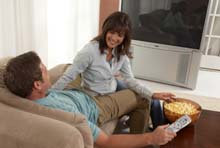
Do you love plopping down on the couch after work (after sitting all day at your desk and then commuting (i.e. sitting) on your way home)? The addiction to too much sitting could be putting your health at risk.
Numerous studies show rates of heart disease, diabetes and obesity are doubled and even tripled in people who sit a lot. Part of the problem is sitting stops the circulation of lipase, an enzyme that absorbs fats. So instead of being absorbed by your muscles, when you’re sitting fat recirculates in your bloodstream where it may end up stored as body fat, clogging arteries or contributing to disease.
For instance, a study in the American Journal of Preventive Medicine even found that the longer a man sits at a desk at work, the greater his chances are of being overweight. Sitting for long hours also puts you at risk of back pain, particularly if you sit with poor posture, leg cramps, tense muscles and, of course, boredom.
Further, one of the most revealing new studies, published in the journal Medicine and Science in Sports and Exercise, linked sitting time with a greater risk of death in more than 17,000 Canadians.
Even after accounting for physical activity levels outside of work, body mass index, age, sex, drinking alcohol and smoking, the mortality risk was 1.54 times higher among those who spent almost all of the day sitting compared with those who spent almost no time sitting, the researchers found.
Those who were considered active (at least 30 minutes of moderate-intensity exercise five days a week) had a lower risk of mortality over the 12 years of follow up as well.
Surprisingly, however, only 5 percent of participants compensated for the time they spent sitting at work through exercise. And even among those who did, the risk of premature death increased depending on how much sedentary time they had in their day.
|
Scheduled Exercise Time
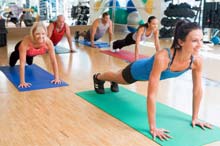
Your body is meant to move around, stand and stretch on a regular basis. So instead of sitting, stand as much as possible and commit to regularly scheduled exercise sessions.
In fact, simply standing up as opposed to sitting engages muscles and helps your body process fat and cholesterol in a positive way, regardless of the amount of exercise you do.
You’ll find you can also easily incorporate some of the movements from Sheanetics into your daily routine. SheaNetics from MySheaNetics.com, founded by fitness expert Shea Vaughn, blends ancient and contemporary movements with eastern philosophy, creating a stylized approach to fitness designed to improve the quality of today’s western living.
We recommend popping a SheaNetics DVD from MySheaNetics.com into your computer at work and completing a five- or 10-minute segment of the video every couple of hours throughout your workday. Most of the moves can be done right in your office, even if you have very little space or privacy.
Making an effort to sit less and exercise more is one of the simpler ways to perhaps drastically improve your health. Start by scheduling a walk three times a day (even just starting with one walk a day with a friend can get you to better health), and the next thing you know you’ll be scheduling and doing daily exercise DVDs at home in the morning and night!
|
| 4. |
Relying on Sick-Care
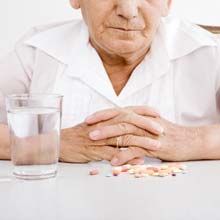
Taking medications and relying on surgery to resolve your symptoms is only a temporary fix -- one that often leads to side effects and typically does nothing to treat the underlying cause of your health issues, symptoms and origins of your illness complaints. Not only are medications expensive, but they will be hard pressed to give you the vim and vigor you’re truly after.
Further, an eye-opening report by Gary Null and colleagues revealed that 2.2 million people suffer from adverse drug reactions to prescribed medications while in a hospital each year. For those taking prescribed medications on their own, at home, side effects also run rampant.
Further, the more you rely on the sick care system to keep you well, the more likely you are to end up in a hospital where you could be exposed to MRSA, C. diff or medical errors -- conditions that could end up making your even sicker or worse.
|
Focusing on HealthCare and “Staying Well”

You have within your ability the power to make positive changes in your life that will greatly reduce, if not eliminate the causes of fatigue, irritability, a clouded mind and even chronic disease. By replacing your reliance on sick care with a reliance on a healthy lifestyle – a healthy diet, regular exercise, proper stress relief -- you’ll be able to stay well, naturally.
To keep stress levels at bay, the staff at SixWise also LOVES Staying Healthy in a Stressful World CD, the highly praised CD by Dr. Peter Reznik, one of the most respected mind/body integrative therapists of our time. The program will actually help you to embark on a practice for transforming your stress into life-enhancing experiences.
If you’re finding it hard to de-stress because of too many “to-do’s” in your daily life, time management experts recommend taking care of as much of the small stuff as possible right away. For instance, stop on any quick errands you can on your way to work, then write back any quick e-mails, make any quick phone calls and get any other fast tasks out of the way immediately.
That way, you can completely forget about these things, rather than holding them somewhere in the back of your mind to accumulate and do later. The end result? You feel less cluttered, less overwhelmed and less stressed.
|
| 5. |
Fast Food and Processed Foods

Every day, 7 percent of the U.S. population visits a McDonald's, and 20-25 percent eat fast food of some kind, says Steven Gortmaker, professor of society, human development, and health at the Harvard School of Public Health in Harvard Magazine. As for children, 30 percent between the ages of 4 and 19 eat fast food on any given day.
Americans get processed food not only from fast-food restaurants but also from their neighborhood grocery stores. As it stands, about 90 percent of the money that Americans spend on food is used to buy -- that's right -- processed foods. However, processed foods are typically poor quality, low nutrition foods. They’ve been linked to health problems including obesity, heart disease, cancer, type 2 diabetes, and more.
As if it weren’t already hard enough to resist, the government actually makes it cheaper for you to buy junk foods than healthy fresh foods. How? By subsidizing crops like corn, soy, wheat and rice.
What this does is make it cheaper for farmers to grow these foods, and in turn cheaper for food manufacturers to stockpile them in your favorite processed and fast foods. The problem, of course, is that these crops are used in such abundance that they exist in record amounts in the foods you feed your family.
For instance, you’d be hard-pressed to find a processed food that does not contain some type of corn, be it corn oil, high fructose corn syrup or one of the countless other variations. Even the cattle you depend on for meat are typically fed corn, even though their natural diet is grass.
For an in-depth look at exactly how the government and agribusiness may be contributing to your food cravings and expanding waistline, check out the movie Food, Inc.
|
Raw Food

As The China Study, one of the most comprehensive looks at how your diet impacts your health, bore out, “a good diet is the most powerful weapon we have against disease and sickness.” By replacing unhealthy fast- and processed foods with raw, whole foods, you’ll feel better in both mind and body.
Raw plant and animal foods (such as raw milk) are loaded with beneficial enzymes for your body. (Enzymes are actually special proteins that act as catalysts for the chemical reactions that occur to keep your body functioning.) However, enzymes begin to be destroyed at temperatures above 110-115 degrees. So if your food is cooked, pasteurized or processed, it will contain no enzymes whatsoever.
Your body contains 2,500 or more different enzymes, and they are very important. Enzymes in your saliva, for instance, help break apart starches, while those in your stomach help break down protein. Enzymes in your intestines, meanwhile, are responsible for breaking apart all of your food, whether fat, protein or carb.
These digestive enzymes are what allow your food to be broken down, and the nutrients absorbed by your bloodstream. The ideal way to add enzymes to your diet is simply by eating more raw foods. Be generous with consuming raw fruits and vegetables, and also consider adding other sources of raw food to your diet, such as raw milk and raw-milk cheese.
For some delicious, enzyme-rich raw food recipes, try out the book "Alive in 5": Raw Gourmet Meals in Five Minutes. Even those who are new to raw foods will enjoy the simple recipes (most can be prepared in five minutes!) for lasagna, spaghetti marinara, stuffed mushrooms, broccoli in cheese sauce, apple pie and more. They're healthy and delicious, and will make you want to eat raw for the taste value alone.
|
| 6. |
Being Overly Sterile

Do you douse your kitchen, bathroom and every surface in between with antibacterial disinfectants and chemical cleansers in the hopes of removing every possible germ, bacteria, virus and dust mite?
Well, if your environment is too clean it will not provide the necessary germ exposures needed to “educate” your immune system so it will know how to launch defenses against infectious organisms. Not only can it make your immune responses inadequate, but it may cause your immune system to overreact to substances in your environment that would ordinarily be harmless, such as pollen, dust or pet dander.
|
Being Healthy Clean
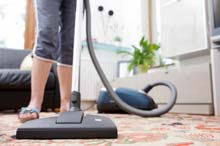
You should strive to keep your home clean … but not sterile.
Studies have shown, for instance, that young children who spend time in daycare (and therefore are exposed to a wide variety of germs) are less likely to develop allergies and asthma, as are those who grew up on farms, with pets or in large families. Other research has shown that children who grow up in very clean homes have a higher risk of developing inflammatory bowel disease
This is why gentle cleansers, such as Liquid Sunshine Non-Toxic Cleaner, are superior to disinfecting detergents. Another option is to use PerfectClean Antimicrobial Microfiber Terry Cloths, Dusters and Mops, which pick up microscopic contaminants with no cleaners needed at all!
|
| 7. |
Texting While Driving

Are you addicted to texting while driving? Drivers using cell phones are 400% more likely to cause a crash than other drivers … and those using a cell phone to send text messages are 800% likelier to be involved in an accident, according to a revealing NYTimes.com video. Numbers of deaths increase at the same rates, so this is one addiction that’s important to break … fast.
|
Texting Only When “Not Driving”

If you have a few texts you want to send, do so before you get behind the wheel, then banish your phone to the trunk so you won’t be tempted. For your own safety and the safety of others on the road, enact a personal driving while texting ban for yourself and your family. Do not use your cell phone while in your car, whether it’s hands-free or hand-held, to talk or to text. The risk is simply too great, and no life is worth sacrificing over a phone call or text message.
|
| 8. |
Taking Antibiotics Unnecessarily
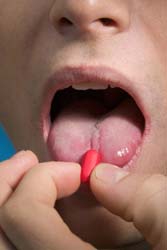
Antibiotics are not inherently dangerous. In fact, when prescribed for bacterial infections like pneumonia, tuberculosis and meningitis they can be, and often are, life-saving.
However, the problem with antibiotics is that they are often prescribed to treat viruses -- against which they are useless. Viruses like upper respiratory infections, measles, mumps, chickenpox, flu, and gastroenteritis are all viral infections, which antibiotics do nothing for.
Antibiotics do kill bacteria, and they do this quite well. The problem is that they not only kill the bad bacteria that may be causing your illness, but they also kill ALL bacteria, including the good kind in your digestive tract that your body needs, leaving barren territory for all sorts of trouble to brew.
If you have taken antibiotics unnecessarily, for a virus, for instance, you have therefore killed off all of the good bacteria in your system and may be more vulnerable to MRSA and other infections.
On a larger scale, using antibiotics unnecessarily not only kills of beneficial bacteria in your body, it is also leading to the increase of antibiotic-resistant bacteria. So if you go to your doctor and you have a viral infection, resist your urge to take antibiotics unnecessarily.
|
Taking Probiotics
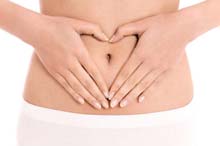
Whereas “antibiotic” means “anti” or “against life,” probiotic means “for life.” If you really want to protect yourself against pathogens, the key is not to take antibiotics but to build your own natural immunity. One way you can do this is by changing your inner environment so no unfriendly bacteria would want to live there. And the way to do this is to make sure you have enough good bacteria present to keep the bad bacteria at bay.
This is why fortifying your gut and immune system health with AbsorbAid Probiotic from NutritionsFinest.com -- a superlative probiotic supplement that provides clinical activities supporting systemic health and wellness through immune-system protection, allergy reduction and effective and enhanced nutrient absorption – is recommended.
Studies have shown that probiotics may be helpful with both immune system modulation and allergies, plus they’re imperative if you’ve recently been on antibiotic therapy. It’s a simple step that may help keep you and your family in the best health possible.
|
| 9. |
Antibacterial Hand Sanitizer

Waterless, alcohol-based hand sanitizers have become increasingly popular in recent years, and many are addicted to using them multiple times a day. However, hand sanitizers, including one of the leading brands, Purell, have been given a seven out of 10 score for toxicity (with 10 being the highest hazard) by the Environmental Working Group’s Skin Deep Cosmetic Safety Database.
Several of the ingredients have noted violations, restrictions and warnings and have been labeled as contamination concerns, occupational hazards, and causing biochemical or cellular level changes.
Alcohol-based hand sanitizers can also be harsh on your skin, leading to tiny cracks on your skin’s surface -- and these cracks may actually provide an entryway for disease-causing organisms.
|
Non-toxic Antimicrobial Hand Wipes
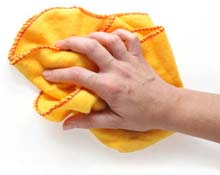
A safe, non-toxic option for keeping your hands clean when you can’t get to a sink are exclusive "antimicrobial" micro-fiber PerfectCLEAN Wipers: Terry Cloths and Super Silks.
PerfectCLEAN Hand Wipers: Terry Cloths and Super Silks are made to meet the rigorous standards of the commercial health care market in support of infection control programs that are required in ultra-clean environments.
They are capable of "trapping and removing" 99.99% of bacteria from hard surfaces throughout your home, and they penetrate invisible surfaces in your skin, then "trap and remove" contaminants, absorbing and concentrating them in the wipes.
Instead of potentially toxic antibacterial hand sanitizers, we recommend carrying non-toxic antimicrobial hand wipes in your pocket and wiping your hand discreetly any time you shake hands or touch a public surface (especially door knobs, shopping cart handles, light switches and other heavily contaminated but rarely cleaned surfaces). Because germs have also been spreading around schools, we recommend you tuck one in your child’s backpack and teach him to wipe his hands regularly throughout the day.
|
| 10. |
Toxic Indoor Air

Breathing is obviously necessary... but what we breathe is what can be addictive ...
People spend about 90 percent of their time indoors, so having clean air inside should be a top priority. However, the air inside your home may be even worse for you than polluted outdoor air. According to the U.S. Environmental Protection Agency (EPA):
"In the last several years, a growing body of scientific evidence has indicated that the air within homes and other buildings can be more seriously polluted than the outdoor air in even the largest and most industrialized cities.
Other research indicates that people spend approximately 90 percent of their time indoors. Thus, for many people, the risks to health may be greater due to exposure to air pollution indoors than outdoors."
|
Clean Air

What you are addicted to and how to replace it can sometimes be easier than your think, and this is exactly the case with the air you breathe.
According to leading health organizations like the American Lung Association, with the rapidly growing volume of air pollution in the home, having a high-quality air purifier is as crucial as having clean drinking water.
The challenge with most air filters or purifiers, however, is that air must be drawn to the unit, either through natural air flow, or through the use of a fan. This method results in uneven treatment and can leave pockets of polluted air, plus fans are noisy, subject to failure, and require higher levels of electricity.
The PIONAIR Smart Pointe Air Treatment System on the other hand, which Sixwise.com highly recommends, uses photocatalysis, which is designed to oxidize organic odors, germs, and fungi. The PIONAIR technology creates ultraviolet light rays, safe levels of ozone, and passive negative ions as part of your air treatment.
Unlike most air purifiers, the PIONAIR™ Air Treatment System doesn't wait for pollutants to contact a filter or plate. Instead, the PIONAIR generates air-purifying technology that migrates through the area and neutralizes organic odors, microbes, & molds at their source.
As a result, the PIONAIR produces fresh clean air throughout your home or office uniformly, by addressing the pollutant source -- without the use of fans, filters, or plates!
|

SixWise Says ...
“Sow an act, and you reap a habit. Sow a habit and you reap a character. Sow a character, and you reap a destiny.”
--Charles Reade
Recommended Reading
Top 9 Things You Thought Were Bad For You… Are Actually Good!
Incorrect Pleasures: The Downsides of Reveling in Hardships … Instead of Celebrating and Enjoying Your Successes?
Sources
Mercola.com November 26, 2003
British Journal of Sports Medicine 2009;43:81-83
PBS.org Affluenza: The Show
To get more information about this and other highly important topics, sign up for your free subscription to our weekly SixWise.com "Be Safe, Live Long & Prosper" e-newsletter.
With every issue of the free SixWise.com newsletter, you’ll get access to the insights, products, services, and more that can truly improve your well-being, peace of mind, and therefore your life!
|
|
|
|